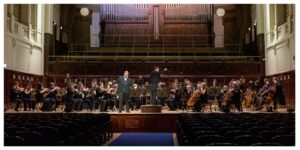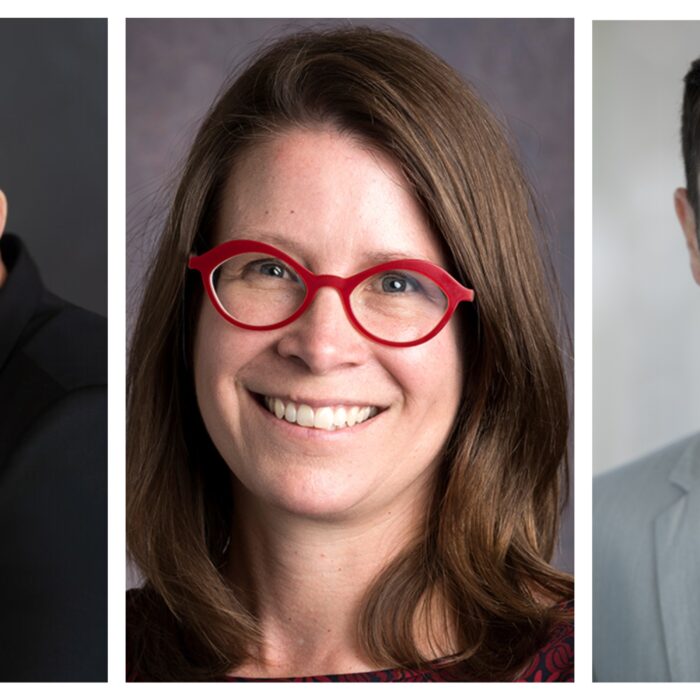
A Program Like No Other – Becca Conviser Founder & Director of Opernfest Prague On its Revolutionary Young Artist Program
By Chris RuelBecca Conviser, founder and director of the innovative young artist program Opernfest Prague (OFP), is a remarkable young industry influencer. In four short years Conviser has built up a program like no other.
At the end of an intense week of instruction and coaching, OFP Fellows perform house auditions, backed by a full orchestra, in front of theater chiefs from across Czechia. Many Fellows leave the program with a contract in hand.
The story of how Conviser went from travelling impromptu to Prague to cover Cio-Cio San, through sketching the idea for a young artist program on a Post-It Note, to launching the fully-fledged program in Czechia, serves as an impressive case study in solving industry challenges. OperaWire spoke with Conviser about the program’s genesis, its mission, and one of the many highlights of the program: house auditions in front of house chiefs from across Czechia.
“I had never been to the Czech Republic,” Conviser said when asked about her initial experience in the country. “I was living in Germany when a house in Prague called me to cover ‘Madame Butterfly’ on 24-hour notice. I didn’t speak one word of the language at that time. But it was an incredible opportunity. And so, I stepped into the role, and from that opportunity, I developed a relationship with the [National Theatre], and other houses throughout the country.
She continued: “I noticed very quickly that there was an opportunity for young artists who may not know that the Czech Republic is an option for building an international career. One of the biggest issues, especially for young American singers, is that you need experience to get a house contract; but you need to be in a house in order to gain that experience.
“When I started sharing the idea, people immediately wanted to know where they could sign up. ‘Whatever it is,’ they said, ‘I’ll be there. Just tell me when it starts.’ I realised that people really wanted this. From there, I spoke to people who had got to know me as an artist and who had been in the industry for a long time.
“The Czech Republic, as a country and as an artistic community, is unbelievably supportive of opera singers. Some people have now seen me do a role five, six, seven, eight times.”
Conviser was the first American in history to professionally reprise the role of Cizí Kněžna, from “Rusalka,” in Czech.
Through the relationships she established among house chiefs, the idea for a different type of young artist program formed; one that spans the gap between graduating from the conservatory and landing a professional gig.
Filling the Gap Between Conservatory & House Experience
One-on-one training, coaching, and consulting are the cornerstones of OFP. Fellows tighten their skills, hone the presentation of their repertoire, and learn the technical nuances of singing and acting that help them stand out in front of juries and casting directors.
“Let’s say you want be the world’s best tightrope walker, right? And you got your master’s degree in tightrope walking, but you only read books about gravity. When you graduate, you’ll be a pretty bad tightrope walker,” Conviser stated. “Someone could be the best Tamino in the entire world—if that was quantifiable. But if they don’t speak the language, or face other challenges, it can limit their opportunities to sing internationally. An artist’s ability to execute must be excellent if they want to get an invitation to sing as an ex-pat. What we try to do at OFP is create an environment that doesn’t exist anywhere else: one where we focus on the technical, stylistic, and dramatic details that are the differentiators in international casting. Everyone works one-on-one with a team of working professionals. We have no assistants or retired industry personnel.
“Besides our training, OFP provides tangible takeaways that are essential for young artists. For instance, one of a singer’s biggest obstacles is having a recording to send for pre-screening. When a Fellow completes our program, they leave with a recording that showcases their skills with a piece that’s right for them and backed a professional orchestra. We try to equip all of our Fellows with a package of materials to give them a platform not just in the Czech Republic, but in Europe, to help propel them to whatever their next goal is.”
OFP Gets Personal
As part of the one-on-one instruction, Fellows bring their own solo repertoire, allowing for real-time conversations about the selections. The Fellows then work with an entire team to locate strengths, weaknesses, and sharpen their skills to a fine point.
“There can be a journey of discovery over the course of the session. A Fellow might come in and want to specialize in the Mozart repertoire, but the instructors might see something different and say, ‘No, you’re kind of over here. So let’s give that a try.’ It happens all the time. We tend to sing what we sing because it’s what we’ve done before. We all need a team of people around us for guidance and to be different ears because working out what one’s repertoire truly is can be such a complicated thing,” noted Conviser. “OFP sessions are a personal experience where we can really share each singer’s story. When house auditions start at the end of the week, the chiefs get to know the person and their story.”
Each day, Fellows spend time with a technician, the conductor, and then the director, providing a holistic approach.
“The director is also the chief of a professional opera house in the Czech Republic. Not only do they understand the character but also understand its marketability. What good is it if you can sing Susannah if that’s not a character which is going to be marketable for you?”
The Big Day
At the end of the week, Fellows sing their pieces, not backed by solo piano but by a full orchestra conducted by maestros of the National Theater. The experience gets them in front of house chiefs, and when they are finished, they can put a legitimate international credit on their resumés. For the house auditions, the directors in the room are actively casting for roles. It’s a win-win for both the singer and the casting directors.
“A lot of these administrators don’t have the chance to hear some of these brilliant singers because of all the systemic things. We can’t change everything overnight but we can say; ‘Hey, here’s a team of incredible, promising individuals. Come, hang out with us for a few hours.’ We help introduce the right person to someone who might be really promising.
“I’ll use Pilsen as an example. The city, though not the largest, has three theaters and an outreach program to schools. They do 650 performances a year across ballet, opera, musical theatre, and drama. Nearly every show sells out. It’s the most incredible operation ever.
“Let’s say their house soprano sings 15 of one of their reprises. That soprano won’t mind if they sing 14. The house gets an international singer. The singer gets an international debut, and because it is a smaller community, the papers love it. They then get an international press write up and a domino effect takes place.”
The OFP Team
Conviser, though she is the originator of the concept, was explicit in stating that OFP is a team effort. It was through them, she said, that the idea on the Post-It Note first took flight.
“Martin Otava, director and chief of the Pilsen theater, thought about who would best fit strategically and help the singers most. We knew we wanted a technician, a conductor, and a director. I credit him immensely with helping with some very difficult details, especially introductions. Yaroslav Kyzlink, the music director at National Theatre Prague, will join our OFP exclusively, and it’s the only young artist program he’ll work with for the year.”
Along with Otava and Kyzlink, OFP boasts a faculty of seven other working professionals ranging from two conductors, a language consultant, an interpreter, two pianists, a répétiteur and a production assistant.
“I don’t run OFP, no, I put amazing people in a room. And they do exactly what they do best.
“One thing that was really important to OFP is having singers of all backgrounds, of all different levels. We don’t believe that A-level training is reserved only for those singers who are already at that level. Everyone deserves respect and high-level training so that they can reach whatever their best is for their individual careers. Good singing is good singing is good singing. And if we can create a community that can help singers be their best stylistically, dramatically, and technically, it’s going to impress people on stages in any country. Every year, so far, we’ve had contracts offered to our singers.”



